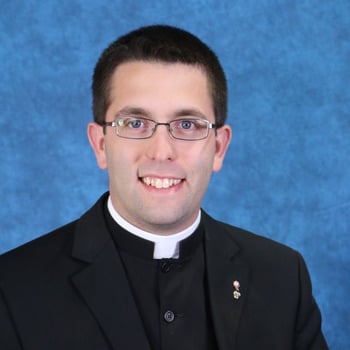How do I explain the Mass to a non-Catholic?
-
September 23, 2025This is a great question, one that strikes at the core of what it is to be Catholic. The Second Vatican Council called the Mass “the source and summit of the Christian life” (Lumen Gentium 11). Thus, for a non-Catholic to understand us, he or she will have to understand the Mass.
Many non-Catholic Christians emphasize the importance of a personal relationship with Jesus, and rightfully so. Our personal relationship with Jesus is a vital and non-negotiable part of our life with God. But Jesus also clearly established a community of the faithful, which we call the Church. In other words, it is not enough to have “me and Jesus.” We must also have “we and Jesus.” The Mass is when we gather as the community of the Church. This is why Sunday Mass is obligatory for Catholics. If you are not coming to Mass, then you are not living as an active member of the Church.
The Mass is presided by the bishop or by a priest. St. Paul calls the Church the “Body of Christ.” Jesus himself is the Head of this Body. The role of the Head is to unite the Body and give life to it. Bishops and priests are not merely educated and trained professionals for a job. They are men who have been ordained and consecrated to act “in the person of Christ the Head.” They have been authorized to do so by the bishops that have come before them, tracing all the way back to the Apostles themselves who were commanded by Jesus at the Last Supper to “Do this in memory of me.” Thus, it is the role of the bishop or the priest to gather the faithful and to preside over the Mass in the person of Christ the Head.
While the Mass has greatly varied in Church’s history and geography, its most basic two-part structure of Liturgy of the Word and Liturgy of the Eucharist is both ancient and universal. You will find this structure in every Catholic Mass, Eastern Christian Divine Liturgy, and even most traditional Protestant Communion Services. This structure most likely goes back to the Apostles themselves, predating the writing of the New Testament. In the Liturgy of the Word, the first Christians likely read from the Old Testament, from the letters of the Apostles, and listened to orally transmitted stories of Jesus that were eventually written down in the four Gospels.
The Liturgy of the Eucharist is the heart of the Catholic Mass. At the risk of oversimplifying, I want to break the Eucharist into two aspects: Sacrifice and Communion.
Sacrifice is the universal act of worship in every religion. We are all called to worship God, and we can do so in many different ways. But they all fall short of the glory of God. There has only been one act of worship in all of history that is truly worthy of God. That is the self-sacrifice of Jesus Christ on the Cross.
In the Liturgy of the Eucharist, Christ’s sacrifice becomes present to us in a mysterious way through his Body and Blood in the appearance of bread and wine. We, as the people of God led by the priest, offer that sacrifice of Christ on the altar at every Mass. (No, we do not kill Christ again. But that’s for a different article). In the Mass Christ allows us to participate in his worthy worship of the Father.
I like to use the comparison of a toddler baking cookies with Mom. The toddler is completely incapable of making the cookies himself. Mom is the one capable of making the cookies, but in order to empower the child she allows the toddler to participate. At the end, when the child presents the cookies to Dad he says, “I made these.” And indeed, he has, but only because Mom let him partake. So too, in the Mass we truly offer God worthy worship, but only because Christ allows us to participate in his act of worship.
Second, the Eucharist is Communion. The very same Jesus who invites us to participate in his worship of the Father is also present in the Eucharist: Body, Blood, Soul, and Divinity. And he allows us to receive him into our very self. Through Holy Communion Jesus pours into us his very life, and we are united to him. “Whoever eats my flesh and drinks my blood remains in me and I in him” (John 6:56).
As we go forth from the Mass, we are meant to take its lessons into our daily lives as Christians. St. Paul tells us, “To offer your bodies as a living sacrifice, holy and pleasing to God, your spiritual worship” (Rom. 12:1). Having just seen and participated in the sacrifice of Jesus’ Body and Blood and having received that same Jesus in Holy Communion, we are now empowered to imitate Jesus in our moral life through self-sacrificing love to God and to our neighbor.
The Mass is our source and summit because it is the gathering of the Church to offer Christ’s worthy worship to Father, to receive Christ in Holy Communion, and by the example and power of Christ in the Eucharist to love God and to love our neighbor.

